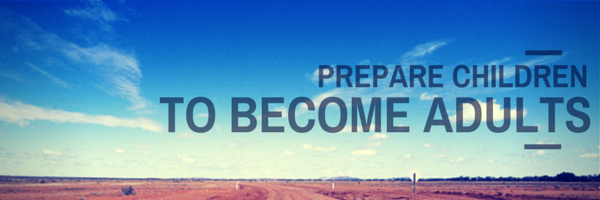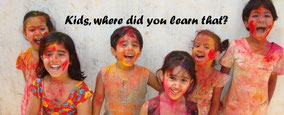Parental involvement in child-rearing runs a wide continuum, from the baby daddy who abandons the family to the tiger mom who scripts a child’s entire life. Slightly inside those extremes are the
provider, typically fathers who spend more time at work than with the family, and the helicopter mom, who seemingly sacrifices her own life to make sure her children have access to every
conceivable opportunity, continually hovering over her children, never letting them out of their sight.

Such extremes are not healthy for either the parent or the child. Certainly, children benefit from the attention of both parents and access to opportunities for education and socialization. But they also need time to themselves for play and to direct their own learning.
Parents also need balance if they are to achieve and maintain positive sense of their own self-actualization. There is nothing wrong with wearing a t-shirt that announces you are “Brittany’s
Mom,” unless it has become your primary identity and a sense of personal self is being sacrificed to that identity.
Such identity confusion also places a huge burden on the child. The inference is that the child is responsible for the parent’s happiness. In effect, the child learns to achieve, not as a measure
of their own abilities, but to accommodate the parent’s needs. It is a co-dependency that contributes to eventual maladaptive behaviors, such as empty nest syndrome (in the parent) or the young adult’s failure to launch.
From this perspective, the goal of parenting; and therefore the measure of parenting success; would be to prepare children to eventually separate from their parents. Such preparation cannot wait
until senior year; it must begin as young as early childhood. In practice, that means that the parent-child relationship evolves gradually and continuously over the two decades.
Obviously, parents exercise full care and responsibility for their infant. Imagine, though, the autonomy a child needs in order to leave their home and attend Kindergarten. Adolescence is so
frustrating for adults because it is the period during which children are struggling toward self-reliance, yet still needing adult guidance to protect them from rash decisions. Young adults
should be able to negotiate the world with parental support, as opposed to active guidance.
While those stages are somewhat obvious, the transitions from stage to stage are not. It is much like watching a child grow. A parent is often unaware of a child’s physical growth, having adapted
their own perception day by day, until an acquaintance, with only periodic contact, mentions it.
And so it goes with parents gradually assisting or allowing a child to grow up. Children need a relationship with both parents, to learn adult roles that will contribute eventually to their own
parenting. The hazard of an absentee baby daddy or even a provider is that the child’s growth is somewhat incomplete. The tiger mom and helicopter mom try to fill the gap with activity and
arbitrary measures of success.
The real challenge of parenting is to adapt one’s parenting style to the age and unique characteristics of the child.


